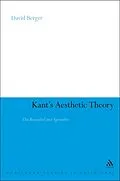Taste is ordinarily thought of in terms of two very different idioms - a normative idiom of taste as a standard of appraisal and a non-normative idiom of taste as a purely personal matter. Kant attempts to capture this twofold conception of taste within the terms of his mature critical philosophy by distinguishing between the beautiful and the agreeable. Scholars have largely taken Kant's distinction for granted, but David Berger argues that it is both far richer and far more problematic than it may appear. Berger examines in detail Kant's various attempts to distinguish beauty from agreeableness. This approach reveals the complex interplay between Kant's substantive aesthetic theory and his broader views on metaphysics and epistemology. Indeed, Berger argues that the real interest of Kant's distinction between beauty and agreeableness is ultimately epistemological. His interpretation brings Kant's aesthetic theory into dialogue with questions at the heart of contemporary analytic philosophy and shows how philosophical aesthetics can offer fresh insights into contemporary philosophical debates.
Autorentext
David Berger teaches philosophy at the University of Michigan, USA.
Inhalt
1. The Twofold Conception of Taste
2. The Beautiful and the Agreeable
3. Sensations and Interests
4. Some Varieties of Normativity
Bibliography
Index
Titel
Kant's Aesthetic Theory
Untertitel
The Beautiful and Agreeable
Autor
EAN
9781441158420
ISBN
978-1-4411-5842-0
Format
E-Book (pdf)
Hersteller
Herausgeber
Genre
Veröffentlichung
01.08.2009
Digitaler Kopierschutz
Adobe-DRM
Dateigrösse
0.74 MB
Anzahl Seiten
176
Jahr
2009
Untertitel
Englisch
Unerwartete Verzögerung
Ups, ein Fehler ist aufgetreten. Bitte versuchen Sie es später noch einmal.
